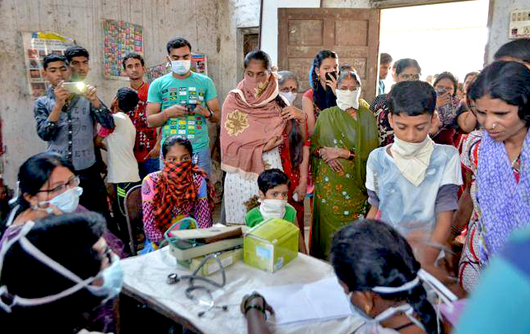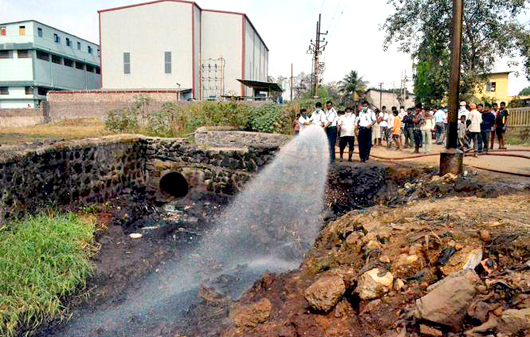New Delhi, Jun 25: India registered its worst single-day increase in COVID-19 cases on Thursday, recording more than 16,000 coronavirus infections, to push the overall tally to 4.73 lakh as the number of fatalities also jumped by 418, the Union Health Ministry said.
This was the sixth consecutive day when coronavirus cases increased by more than 14,000. On June 20, the country registered an increase of 14,516 cases. On June 21, the increase was of 15,413 cases; 14,821 cases on June 22; 14,933 cases on June 23; and 15,968 cases on June 24.
Consequently, India added 92,573 cases since June 20, and over 2.82 lakh this month since June 1.
The health ministry data updated at 8am on Thursday showed the daily tally increased by the highest-ever 16,922 cases to reach 4,73,105, while the total deaths climbed to 14,894 with 418 new fatalities.
However, according to the data, the recovery rate has improved to 57.43 per cent. The number of active cases stands at 1,86,514 while 2,71,696 people have recovered; one patient has migrated.
The total number of confirmed cases included foreigners.
According to ICMR, a total of 75,60,782 samples have been tested up to June 24 with 2,07,871 samples being tested on Wednesday.
Of the 418 new deaths, 208 were in Maharashtra, 64 in Delhi, 33 in Tamil Nadu, 25 in Gujarat, 14 in Karnataka, 11 in West Bengal, 10 each in Rajasthan and Haryana, nine in Madhya Pradesh, eight each in Uttar Pradesh and Punjab, five each in Andhra Pradesh, Telangana and Uttarakhand.
Bihar, Goa and Jammu and Kashmir have reported one COVID-19 fatality each.
Of the total fatalities, Maharashtra tops the tally with 6,739 deaths followed by Delhi (2,365), Gujarat (1,735), Tamil Nadu (866), Uttar Pradesh (596), West Bengal (591), Madhya Pradesh (534), Rajasthan (375) and Telangana (225).
The COVID-19 death toll reached 188 in Haryana, 164 in Karnataka, 124 in Andhra Pradesh, 113 in Punjab, 88 in Jammu and Kashmir, 57 in Bihar, 35 in Uttarakhand, 22 in Kerala and 17 in Odisha.
Chhattisgarh has registered 12 deaths, Jharkhand 11, Assam and Puducherry nine each, Himachal Pradesh eight, Chandigarh six, Goa two and Meghalaya, Tripura and Ladakh have reported one fatality each.
More than 70 per cent deaths took place due to comorbidities, the health ministry said.
Maharashtra has reported the highest number of cases at 1,42,900 followed by Delhi at 70,390, Tamil Nadu at 67,468, Gujarat at 28,943, Uttar Pradesh at 19,557, Rajasthan at 16,009 and West Bengal at 15,173, according to ministry data.
The number of COVID-19 cases has gone up to 12,448 in Madhya Pradesh, 12,010 in Haryana, 10,444 in Telangana,10,331 in Andhra Pradesh and 10,118 in Karnataka.
It has risen to 8,209 in Bihar, 6,422 in Jammu and Kashmir, 6,198 in Assam and 5,752 in Odisha. Punjab has reported 4,627 novel coronavirus infections so far, while Kerala has 3,603 cases.
A total of 2,623 people have been infected by the virus in Uttarakhand, 2,419 in Chhattisgarh, 2,207 in Jharkhand, 1,259 in Tripura, 970 in Manipur, 951 in Goa, 941 in Ladakh and 806 in Himachal Pradesh.
Puducherry has recorded 461 COVID-19 cases, Chandigarh has 420, Nagaland has 347, Arunachal Pradesh has 158 and Mizoram has 142 cases.
Dadra and Nagar Haveli and Daman and Diu together have reported 120 COVID-19 cases.
Sikkim has 84, Andaman and Nicobar Islands has registered 56 infections so far while Meghalaya has recorded 46 cases.
"Our figures are being reconciled with the ICMR (Indian Council of Medical Research)," the ministry said, adding 8,493 cases are being reassigned to states.
State-wise distribution is subject to further verification and reconciliation, it added.







Comments
Add new comment